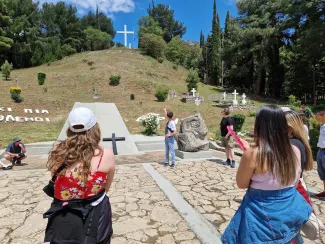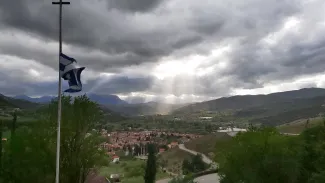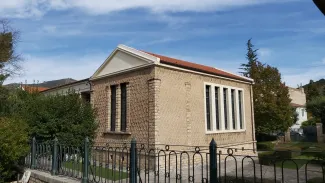Kalavryta is one of the places being most affected by the German Occupation of Greece between 1941 and 1944. The tragedy of the village followed when in the morning of 13th December 1943 all inhabitants were ordered to gather in the Primary School. Having been separated from women and children, the men were afterwards led on top of the hill of Kapi where 465 of them were executed leaving only 13 survivors. This massacre was declared as “atonement” for the execution of 78 German soldiers by the ELAS although Kalavryta never had partisans. After the war, it took a long time for Kalavryta to be rebuilt and the memory of this 13th December 1943 has always remained awake. Therefore, a decision was made to transform the former Primary School which women and children had been held hostages in into a museum for the Occupation in general as well as the Kalavritan Holocaust. This museum was opened in 2005 and has since provided insights in various perspectives on the Second World War in Greece, such as those of the Germans, the Partisans and the Kalavritans.
Since 2021, German volunteers of ASF have been serving here with their work being various and approaching Kalavryta’s history from many points. As for me, Johannes Lücke, who I have been here since September 2023 my work was mainly concerned with work on various archives, both German and Greek ones, which all provided slightly different perspectives on the happenings in Kalavryta. In addition, I was given the long-lasting task of translating parts of the Museum’s website which deal with Greek and European Martyr Towns and Villages and have only been available in Greek. Through my work they will soon also be to read in English and German. Whenever the Museum encountered unusual events, such as the Memory Service on 13th Dec 2023 or the visit by the Prime Minister Kyriakos Mitsotakis on 2nd April 2024, I was of course involved in the preparations and the conduct of those. Of special pleasure for me have been always the days on which I could give people or groups tours through the museum since this provided most contact with other people and gave me the opportunity of sharing what I learned during my time in Kalavryta.
I hope to have given a sufficient overview over what is and was and will come for the volunteers in Kalavryta, a village where history becomes haptic.
Sending organisation: ASF (Aktion Sühnezeichen Friedensdienste e.V.)
Hosting organisation: Filoxenia, Intercultural-Environmental Organisation
Co-funded by the European Union
 ,
, 


